常见英语动词包括及物动词,不及物动词的固定搭配
英语动词的用法归纳总结

英语动词的用法归纳总结动词是英语语法中的一个重要部分,它用于表示一个人、物或事物所做的动作、行为或状态。
下面是几种常见的英语动词用法的总结:1. 及物动词(Transitive verbs):表示动作的动词后面可以接一个宾语,宾语接在动词的后面,它们之间有直接的关系。
例如:I kicked the ball.(我踢了球。
)2. 不及物动词(Intransitive verbs):表示动作的动词后面没有宾语,它们自己就是整个谓语,不需要补充其他成分。
例如:He sleeps.(他睡觉。
)3. 联系动词(Linking verbs):用于连接主语和主语的补足语,对主语进行描述或指示。
常见的连接动词有be(是、在)、seem(似乎)、become(变成)等。
例如:He is a teacher.(他是一名教师。
)4. 助动词(Auxiliary verbs):帮助其他动词构成时态、语态和情态的动词。
常见的助动词有be、do、have等。
例如:Heis studying.(他正在学习。
)5. 情态动词(Modal verbs):用于表示说话人对某个行为或状态的看法、推测、建议、许可等。
常见的情态动词有can、could、may、might等。
例如:I can swim.(我会游泳。
)6. 及物动词+副词(Phrasal verbs):由一个动词和一个副词组成的短语,表示特定的意义。
例如:She turned up the volume.(她调高了音量。
)7. 不及物动词+介词(Prepositional verbs):由一个动词和一个介词组成的短语,表示特定的意义。
例如:He insisted on going.(他坚持要去。
)8. 及物动词+宾补(Transitive verbs with object complements):动词之后有一个宾语和一个宾补,它对宾语进行进一步的描述或说明。
例如:They named the baby John.(他们给宝宝起名叫约翰。
英语及物动词和不及物动词
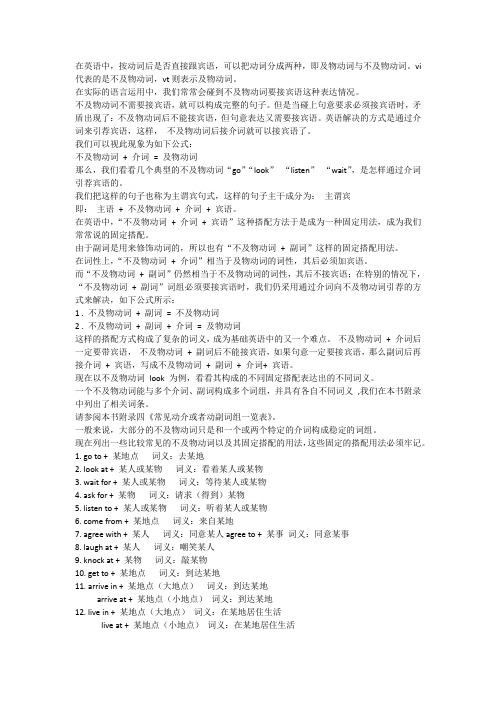
在英语中,按动词后是否直接跟宾语,可以把动词分成两种,即及物动词与不及物动词。
vi 代表的是不及物动词,vt则表示及物动词。
在实际的语言运用中,我们常常会碰到不及物动词要接宾语这种表达情况。
不及物动词不需要接宾语,就可以构成完整的句子。
但是当碰上句意要求必须接宾语时,矛盾出现了:不及物动词后不能接宾语,但句意表达又需要接宾语。
英语解决的方式是通过介词来引荐宾语,这样,不及物动词后接介词就可以接宾语了。
我们可以视此现象为如下公式:不及物动词+ 介词= 及物动词那么,我们看看几个典型的不及物动词“go”“look”“listen”“wait”,是怎样通过介词引荐宾语的。
我们把这样的句子也称为主谓宾句式,这样的句子主干成分为:主谓宾即:主语+ 不及物动词+ 介词+ 宾语。
在英语中,“不及物动词+ 介词+ 宾语”这种搭配方法于是成为一种固定用法,成为我们常常说的固定搭配。
由于副词是用来修饰动词的,所以也有“不及物动词+ 副词”这样的固定搭配用法。
在词性上,“不及物动词+ 介词”相当于及物动词的词性,其后必须加宾语。
而“不及物动词+ 副词”仍然相当于不及物动词的词性,其后不接宾语;在特别的情况下,“不及物动词+ 副词”词组必须要接宾语时,我们仍采用通过介词向不及物动词引荐的方式来解决,如下公式所示:1 . 不及物动词+ 副词= 不及物动词2 . 不及物动词+ 副词+ 介词= 及物动词这样的搭配方式构成了复杂的词义,成为基础英语中的又一个难点。
不及物动词+ 介词后一定要带宾语,不及物动词+ 副词后不能接宾语,如果句意一定要接宾语,那么副词后再接介词+ 宾语,写成不及物动词+ 副词+ 介词+ 宾语。
现在以不及物动词look 为例,看看其构成的不同固定搭配表达出的不同词义。
一个不及物动词能与多个介词、副词构成多个词组,并具有各自不同词义,我们在本书附录中列出了相关词条。
请参阅本书附录四《常见动介或者动副词组一览表》。
动词分类总结

动词分类总结在语法学中,动词是一个重要的词类,它用来表示人、事物、状态和动作。
根据其特征和用法,动词可以分为多种不同的分类。
本文将对常见的动词分类进行总结,帮助读者更好地理解和运用动词。
一、按照动作性质分类1. 及物动词:及物动词需要有宾语来构成完整的意义,它表示主语对宾语施加的动作或影响。
例如:打球、吃饭、写信。
2. 不及物动词:不及物动词不需要宾语,它表示主语自身的动作或状态。
例如:走、跳、站立。
3. 联系动词:联系动词用来连接主语和表语,表示主语的状态、身份、特征等。
例如:是、变成、看起来。
二、按照时态和语态分类1. 时态动词:时态动词用于表示动作或状态所处的时间。
例如:看、写、听。
2. 语态动词:语态动词表示主语的动作是被动的还是主动的。
例如:喝(主动语态)、被喝(被动语态)。
三、按照形式分类1. 不定式动词:不定式动词以to加动词原形构成,可作主语、宾语、表语等,常用于表达目的、愿望、能力等。
例如:to go、to play。
2. 分词动词:分词动词既可以作动词,也可以作形容词或副词,常用于修饰名词和补充主语或宾语的信息。
例如:running(进行式分词)、broken(过去分词)。
3. 助动词:助动词用来帮助表示动作或状态,并与其他动词搭配使用。
例如:can、will、have。
四、按照语气分类1. 实义动词:实义动词具有明确的含义,可以独立使用,表达实际动作或状态。
例如:走、吃、看。
2. 系动词:系动词用来连接主语和表语,本身没有实际含义。
例如:是、变得、看起来。
五、按照情态分类情态动词是一类有特殊意义的动词,用于表示说话人对某种可能性、能力、义务、建议、许可等态度。
常见的情态动词有can、could、may、might、shall、should、will、would、must等。
六、按照动作完成程度分类1. 瞬间动词:瞬间动词表示动作在极短的时间内完成。
例如:打开、关上。
2. 持续动词:持续动词表示动作在一段时间内持续进行。
高中英语常用动词短语固定搭配完整版

动词及物动词Vt 直接跟宾语I love you.不及物动词Vi 不跟宾语I live in Beijing.系动词link 跟表语Her face becomes red.助动词跟动词原形或分词Would you please tell me something about it 情态动词跟动词原形We must compete for survival.一、接不定式而不接动名词作宾语的24个常用动词afford to do sth. 负担得起做某事agree to do sth. 同意做某事arrange to do sth.安排做某事ask to do sth. 要求做某事beg to do sth. 请求做某事care to do sth. 想要做某事choose to do sth. 决定做某事decide to do sth. 决定做某事demand to do sth. 要求做某事determine to do sth. 决心做某事expect to do sth. 期待做某事fear to do sth. 害怕做某事help to do sth. 帮助做某事hope to do sth. 希望做某事learn to do sth. 学习做某事manage to do sth. 设法做某事offer to do sth. 主动提出做某事plan to do sth. 计划做某事prepare to do sth. 准备做某事pretend to do sth. 假装做某事promise to do sth. 答应做某事refuse to do sth. 拒绝做某事want to do sth. 想要做某事wish to do sth. 希望做某事注:有些不及物动词后习惯上也接不定式,不接动名词:aim to do sth. 打算做某事fail to do sth. 未能做某事long to do sth. 渴望做某事happen to do sth. 碰巧做某事hesitate to do sth. 犹豫做某事struggle to do sth. 努力做某事二、接不定式作宾补的36个常用动词advise sb. to do sth. 建议某人做某事allow sb. to do sth. 允许某人做某事ask sb. to do sth.请叫某人做某事bear sb. to do sth.忍受某人做某事beg sb. to do sth. 请求某人做某事cause sb. to do sth. 导致某人做某事command sb. to do sth. 命令某人做某事drive sb. to do sth .驱使某人做某事elect sb. to do sth. 选举某人做某事encourage sb. to do sth. 鼓励某人做某事expect sb. to do sth. 期望某人做某事forbid sb. to do sth. 禁止某人做某事force sb. to do sth. 强迫某人做某事get sb. to do sth. 使要某人做某事hate sb. to do sth. 讨厌某人做某事help sb. to do sth. 帮助某人做某事intend sb. to do sth. 打算要某人做某事invite sb. to do sth. 邀请某人做某事leave sb. to do sth. 留下某人做某事like sb. to do sth. 喜欢某人做某事mean sb. to do sth. 打算要某人做某事need sb. to do sth. 需要某人做某事oblige sb. to do sth. 迫使某人做某事order sb. to do sth. 命令某人做某事permit sb. to do sth. 允许某人做某事persuade sb. to do sth. 说服某人做某事prefer sb. to do sth. 宁愿某人做某事request sb. to do sth. 要求某人做某事remind sb. to do sth. 提醒某人做某事teach sb. to do sth .教某人做某事tell sb. to do sth. 告诉某人做某事train sb. to do sth. 训练某人做某事trouble sb. to do sth. 麻烦某人做某事want sb. to do sth. 想要某人做某事warn sb. to do sth. 警告某人做某事wish sb. to do sth. 希望某人做某事要表示以上意思,可换用其他表达:汉语的“原谅某人做某事”,英语可说成excuse forgive sb. for doing sth.; 汉语的“希望某人做某事”,英语可说成wish sb. to do sth.;汉语的“建议某人做某事”,英语可说成advise sb. to do sth.;汉语的“安排某人做某事”,英语可说成arrange for sb. to do sth.;汉语的“要求某人做某事”,英语可说成demand of sb. to do sth.;汉语的“感谢某人做某事”,英语可说成thank sb. for doing sth.;汉语的“祝贺某人做某事”,英语可说成congratulate sb. on doing sth.;汉语的“阻止某人做某事”,英语可说成prevent sb. from doing sth.;三、接动名词不接不定式作宾语的34个常用动词admit doing sth. 承认做某事advise doing sth. 建议做某事allow doing sth. 允许做某事appreciate doing sth. 感激做某事avoid doing sth. 避免做某事consider doing sth. 考虑做某事delay doing sth. 推迟做某事 deny doing sth. 否认做某事discuss doing sth. 讨论做某事 dislike doing sth. 不喜欢做某事enjoy doing sth. 喜爱做某事escape doing sth. 逃脱做某事excuse doing sth. 原谅做某事 fancy doing sth. 设想做某事finish doing sth. 完成做某事forbid doing sth. 禁止做某事forgive doing sth. 原谅做某事 give up doing sth. 放弃做某事imagine doing sth. 想象做某事 keep doing sth. 保持做某事mention doing sth. 提及做某事 mind doing sth. 介意做某事miss doing sth. 错过做某事pardon doing sth. 原谅做某事permit doing sth. 允许做某事 practice doing sth. 练习做某事prevent doing sth. 阻止做某事 prohibit doing sth. 禁止做某事put off doing sth. 推迟做某事 report doing sth. 报告做某事risk doing sth. 冒险做某事stop doing sth. 停止做某事suggest doing sth. 建议做某事 understand doing sth. 理解做某事四、接现在分词作宾补的20个常用动词bring sb. doing sth.引起某人做某事 catch sb. doing sth. 碰上撞上某人做某事discover sb. doing sth. 发现某人做某事feel sb. doing sth. 感觉某人做某事find sb. doing sth. 碰上撞上某人做某事 get sb. doing sth. 使某人做某事have sb. doing sth. 使某人做某事 hear sb. doing sth. 听见某人做某事keep sb. doing sth. 使某人不停地做某事 listen to sb. doing sth. 听某人做某事look at sb. doing sth. 看着某人做某事 notice sb. doing sth. 注意到某人做某事observe sb. doing sth. 观察某人做某事prevent sb. doing sth. 阻止某人做某事see sb. doing sth. 看见某人做某事 send sb. doing sth.使某人突然做某事set sb. doing sth. 使引起某人做某事start sb. doing sth. 使某人开始做某事stop sb. doing sth. 阻止某人做某事 watch sb. doing sth. 观五、接动词原形作宾补的11个常用动词feel sb. do sth. 感觉某人做某事have sb. do sth. 使某人做某事hear sb. do sth. 听见某人做某事 let sb. do sth.让某人做某事listen to sb. do sth. 听着某人做某事 look at sb. do sth. 看着某人做某事make sb. do sth. 使某人做某事 notice sb. do sth. 注意某人做某事observe sb. do sth. 观察某人做某事 see sb. do sth. 看见某人做某事watch sb. do sth. 观察某人做某事察某人做某事六、接不定式或动名词作宾语意思相同的12个动词like to do sth / like doing sth. 喜欢做某事love to do sth / love doing sth. 喜欢做某事hate to do sth / hate doing sth. 憎恨做某事prefer to do sth / prefer doing sth. 宁可做某事begin to do sth / begin doing sth. 开始做某事start to do sth / start doing sth. 开始做某事continue to do sth / continue doing sth. 继续做某事can’t bear to do sth / can’t bear doing sth. 不能忍受做某事bother to do sth / bother doing sth. 麻烦做某事intend to do sth / intend doing sth.想要做某事attempt to do sth / attempt doing sth. 试图做某事cease to do sth / cease doing sth. 停止做某事七、接不定式或动名词作宾语意思不同的7个动词1 remember to do sth. 记住要做某事 remember doing sth. 记住曾做过某事2 forget to do sth. 忘记要做某事 forget doing sth. 忘记曾做过某事3 regret to do sth. 后悔遗憾要做某事 regret doing sth. 后悔遗憾曾做过某事4 try to do sth. 设法要做某事 try doing sth. 做某事试试看有何效果5 mean to do sth. 打算做某事mean doing sth. 意味着做某事6 can’t help to do sth. 不能帮助做某事can’t help doing sth. 禁不住做某事7 go on to do sth. 做完某事后接着做另一事 go on doing sth. 继续做一直在做的事注:stop to do sth. 与stop doing sth.也不同,前者指停下来去做某事,后者指停止正在做的事,但stop to do sth. 中的不定式不是宾语,是目的状语;八、可接双宾语的38个常用动词1 双宾语易位时需借助介词to的常用动词award sb. sth. = award sth. to sb. 颁奖给某人bring sb. sth. = bring sth. to sb. 把某物带给某人hand sb. sth. =hand sth. to sb. 把某物递给某人lend sb. sth. = lend sth. to sb. 把某物借给某人mail sb. sth. = mail sth. to sb. 把某物寄给某人offer sb. sth. = offer sth. to sb. 将某物给某人owe sb. sth. = owe sth. to sb. 欠某人某物pass sb. sth. = pass sth. to sb. 把某物递给某人pay sb. sth. = pay sth. to sb. 付给某人某物钱post sb. sth. = post sth. to sb. 把某物寄给某人read sb. sth. = read sth. to sb. 把某物读给某人听return sb. sth. = return sth. to sb. 把某物还给某人send sb. sth. = send sth. to sb. 把某物送给某人sell sb. sth. = sell sth. to sb. 把某物卖给某人serve sb. sth. = serve sth. to sb. 拿某物招待某人show sb. sth. = show sth. to sb. 拿某物给某人看take sb. sth. = take sth. to sb. 把某物拿给某人teach sb. sth. = teach sth. to sb. 教某人某物tell sb. sth. = tell sth. to sb. 告诉某人某情况throw sb. sth. = throw sth. to sb. 把某物扔给某人write sb. sth. = write sth. to sb. 给某人写信2 双宾语易位时需借助介词for的常用动词book sb. sth. = book sth. for sb. 为某人预定某物buy sb. sth. = buy sth. for sb. 为某人买某物choose sb. sth. = choose sth. for sb. 为某人选某物cook sb. sth. = cook sth. for sb. 为某人煮某物draw sb. sth. = draw sth. for sb. 为某人画某物fetch sb. sth. = fetch sth. for sb. 为某人去取某物find sb. sth. = find sth. for sb. 为某人找到某物fix sb. sth. = fix sth. for sb. 为某人准备某物get sb. sth. = get sth. for sb. 为某人拿来某物make sb. sth. = make sth. for sb. 为某人做某物order sb. sth. = order sth. for sb. 为某人订购某物pick sb. sth. = pick sth. for sb. 为某人采摘某物prepare sb. sth. = prepare sth. for sb. 为某人准备某物save sb. sth. = save sth. for sb. 为某人留某物sing sb. sth. = sing sth. for sb. 为某人唱某物歌spare sb. sth. = spare sth. for sb. 为某人让出某物steal sb. sth. = steal sth. for sb. 为某人偷某物注:有的动词后接的双宾语易位时,既可用介词to引出间接宾语,也可用介词for引出间接宾语,含义相同,如bring,play等:Bring me today’s paper. = Bring today’s paper to for me. 把今天的报纸拿给我;He played us the record he had just bought. = He played the record he had just bought for to us. 他放了他刚买的唱片给我们听;有的动词后接的双宾语易位时,即可用介词to引出间接宾语,也可用介词for引出间接宾语,含义不同,如leave等:They left me no food. = They left no food for me. 他们没给我留一点食物;My uncle left me a large fortune. = My uncle left a large fortune to me.我叔叔死后留下一大笔财产给我;而有的动词后接双宾语时,既不能用介词to引出间接宾语,也不能用介词for引出间接宾语,如allow, ask, cause, charge, cost, forgive, refuse等:He allows his son too much money. 他给他儿子的钱太多;He asked me some questions. 他问了我一些问题;This caused me much trouble. 着给我带来了许多麻烦;He charged me five dollars for a cup of tea. 他一杯茶向我要了5美元;His mistake cost him his job. 他的错误让他丢了工作;I envy you your good luck. 我羡慕你的好运;They forgave him his rudeness. 他们原谅了他的鲁莽;He refused her nothing. 她要什么就给什么;九、可用于“动词+sb+of sth”的8个常见动词accuse sb. of sth. 控告某人犯某事罪,cheat sb. fo sth. 骗取某人某物cure sb. of sth. 治好某人的病,改掉人坏习惯inform sb. of sth. 通知某人某情况事remind sb. of sth. 使某人想起某情况事rid sb. of sth. 使某人摆脱某物rob sb. of sth. 抢劫某人的某东西warn sb. of sth. 警告某人有某情况十、可用于“动词+sb+for doing sth”的8个常见动词blame sb. for doing sth. 指责某人做某事criticize sb. for doing sth. 批评某人做某事forgive sb. for doing sth. 原谅某人做某事excuse sb. for doing sth. 原谅某人做某事pardon sb. for doing sth. 原谅某人做某事punish sb. for doing sth. 惩罚某人做某事scold sb. for doing sth. 指责责备某人thank sb. for doing sth. 感谢某人做某十一、可用于“动词+sb+into doing sth”的9个常见动词cheat sb. into doing sth. 欺骗某人做某事 trick sb. into doing sth. 欺骗某人做某事food sb. into doing sth. 欺骗某人做某事force sb. into doing sth. 迫使某人做某事argue sb. into doing sth. 说服某人做某事 talk sb. into doing sth. 说服某人做某事terrify sb. into doing sth. 威胁某人做某事frighten sb. into doing sth. 吓唬某人做某persuade sb. into doing sth. 说服某人做某事十二、容易误用作不及物动词的8个及物动词serve sb.为某人服务 marry sb. 与某人结婚discuss sth. 讨论某事 mention sth. 提到某enter a room 进入房间 contact sb. 与某人联系 equal sth. 等于某物ring sb给某人打电话注:有个别词在用于其他意义时,可以是不及物的,如enter into可以表示开始进入或从事某一状态或活动,或用于较抽象的概念;如:The country entered into a state of war. 这个国家进入战争状态;I can enter into your feelings at the loss of your father. 我理解你失去父亲后的心情;The two old men entered into a long conversation. 两位老人开始长谈起来;短语动词Depend on, object to, consist of, lead to, insist on,refer to, rely on, resort to, speak to, belong to, apologize for一、容易误用作及物动词的9个不及物动词deal with a problem 处理问题depend on sb. 依靠依赖某人insist on doing sth. 坚持要做某事knock on at the door 敲门operate on sb. 为某人做手术 participate in sth. 参加某事refer to sth. 查阅参考某物 rely on sb. / sth. 依靠某人reply to a letter 回信注:在某些其他用法中,以上有的动词也可能及物,如insist, reply等动词后可接宾语从句,operate表示“操作”、“管理”等时则及物;二、17个常用“be+形容词+about”结构be angry about 为……生气be anxious about 为……担忧be careful about 当心…… be certain about 确信……be curious about 对……好奇 be disappointed about 对……失望be excited about 对……感到兴奋be glad about 对……感到高兴be happy about 为……感到高兴 be hopeful about 对……抱有希望be mad about 对……入迷be nervous about 为……感到不安be particular about 对……讲究 be sad about 为……而难过be serious about 对……认真be sure about 对……有把握be worried about 为……担忧三、10个常用“be+形容词+a t”结构be angry at 为……生气 be bad at 不善于……be clever at 擅长于……be disappointed at 对……失望be expert at 在……方面是内行 be good at 善于……be mad at 对……发怒 be quick at 在……方面敏捷be skilful at 在……方面熟练 be slow at 在……方面迟钝四、18个常用“be+形容词+for”结构be anxious for 渴望 be bad for 对……有害,对……不利be bound for 前往 be celebrated for 以……出名be convenient for 对……方便,在……附近 be eager for渴望be famous for 因……闻名 be fit for 合适,适合be good for 对……有益方便be grateful for 感谢be hungry for 渴望得到 be late for 迟到be necessary for 对……有必要 be ready for 为……准备好be sorry for 因……抱歉 be suitable for 对……合适适宜be thankful for 因……而感激 be well-known for以……出名五、6个常用“be+形容词+from”结构be absent from 缺席,不在be different from 与……不同be far from 离……远,远远不 be free from 没有,免受be safe from 没有……的危险 be tired from 因……而疲劳六、13个常用“be+形容词+in”结构be concerned in 与……有关be disappointed in 对某人感到失望be engaged in 从事于,忙于 be experienced in 在……方面有经验be expert in 在……方面是行家 be fortunate in 在……方面幸运be honest in 在……方面诚实 be interested in 对……感兴趣be lack in 缺乏 be rich in 富于,在……方面富有be skilful in 擅长于 be successful in 在……方面成功be weak in 在……方面不行七、18个常用“be+形容词+of”结构be afraid of 害怕 be ashamed of 为……感到羞愧be aware of 意识到,知道be capable of 能够,可以be careful of 小心,留心be certain of 确信,对……有把握be fond of 喜欢 be free of 没有,摆脱be full of 充满 be glad of 为……而高兴be nervous of 害怕 be proud of 为……自豪be short of 缺乏 be shy of 不好意思be sick of 对……厌倦 be sure of 肯定,有把握be tired of 对……厌烦 be worthy of 只得,配得上八、20个常用“be+形容词+to”结构be accustomed to 习惯于 be blind to 对……视而不见be close to 靠近,接近 be cruel to 对……残酷,对……无情be devoted to 献身,专心于be equal to 等于,能胜任be familiar to 为某人所熟悉 be harmful to 对……有危害be important to 对……重要p; be open to 对……开放,易受到be opposed to 反对,不赞成be opposite to 在……对面,和……相反be polite to 对……有礼貌be related to 与……有关是亲戚be respectful to 尊敬be rude to 对……无礼be similar to 与……相似be true to 忠实于,信守be used to 习惯于be useful to 对……有用九、16个常用“be+形容词+wit h”结构be angry with 对某人生气 be bored with 对……厌烦be busy with 忙于 be careful with 小心be concerned with 关于,与……有关 be content with 以……为满足be delighted with 对……感到高兴 be disappointed with 对某人失望be familiar with 熟悉,精通be honest with 对某人真诚be ill with 患……病 be patient with 对某人有耐心be pleased with 对……满意高兴 be popular with 受……欢迎be satisfied with 对……满意 be strict with 对某人严格十、24个常用“in+其他词+of”结构in advance of 在……前面 in aid of 帮助in behalf of 为了,为了……的利益 in case of 如果,万一,以防in celebration of 庆祝 in charge of 负责,管理in commemoration of 纪念,庆祝 in defense of 保卫in explanation of 解释 in face of 面对in favour of 赞成,主张 in front of 在……前面in honor of 纪念,祝贺,欢迎 in memory of 纪念in need of 需要 in place of 代替in possession of 拥有 in praise of 称赞in respect of 关于,就……而言 in search of 寻找,搜找in sight of 看得见,在看见……的地方in spite of 虽然,尽管in support of 为了支持拥护……in view of 鉴于,考虑到注:同时注意一下相似结构:in exchange for 作为对……的交换 in preparation for 为……作准备in return for 作为……的报答 in reward for 作为……的报酬in addition to 加之,除……之外 in answer to 回答,响应in contrast to with 与……形成对比 in opposition to 与……相反,反对in reply to 作为对……的回答答复 in response to 回答,响应in with reference to 关于 in with regard to 关于二十三、27个带to doing sth.的常用结构1.动词+介词to+动名词1 admit to doing sth. 承认做了某事2 apply to doing sth. 适用于做某事3 object to doing sth. 反对做某事4 see to doing sth. 负责做某事5 stick to doing sth. 坚持做某事6 take to doing sth. 喜欢/习惯上做2.动词+宾语+介词to+动名词1 apply oneself to doing sth. 专心致力于做某事2 devote sth. to doing sth. 把…献给做3 devote oneself to doing sth. 献身于4 limit sth. to doing sth. 把…限制在做5 reduce sb. to doing sth. 使某人沦为做3.动词+名词+介词to+动名词1 give one’s life to doing sth.献身于做2 give one’s mind to doing sth. 专心做3 have a dislike to doing sth. 厌恶做某4 have an eye to doing sth. 注意做某事5 have an objection to doing sth.反对反感做某事6 pay attention to doing sth. 注意做事7 set one’s mind to doing sth. 决心做4.be+形容词+介词to+动名词1 be equal to doing sth. 等于做某事,2 be used to doing sth. 习惯于做某事3 be opposed to doing sth. 反对做某事4 be reduced to doing sth. 使某人沦为5 be devoted to doing sth. 把时间钱,精力等献给做某事6 be limited to doing sth. 把……限制在5.其他结构+介词to+动名词1 get down to doing sth. 开始做某事, 认真处理某事2 look forward to doing sth. 盼望做某3 What do you say to doing sth你认为做某事如何。
常见英语动词包括及物动词不及物动词的固定搭配
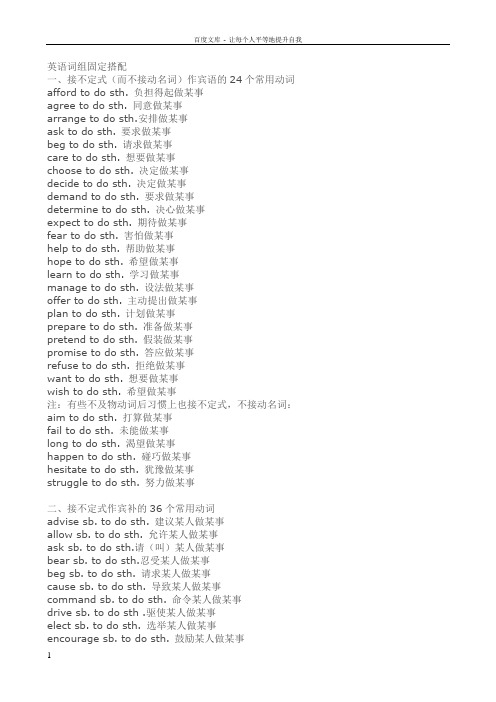
英语词组固定搭配一、接不定式(而不接动名词)作宾语的24个常用动词afford to do sth. 负担得起做某事agree to do sth. 同意做某事arrange to do sth.安排做某事ask to do sth. 要求做某事beg to do sth. 请求做某事care to do sth. 想要做某事choose to do sth. 决定做某事decide to do sth. 决定做某事demand to do sth. 要求做某事determine to do sth. 决心做某事expect to do sth. 期待做某事fear to do sth. 害怕做某事help to do sth. 帮助做某事hope to do sth. 希望做某事learn to do sth. 学习做某事manage to do sth. 设法做某事offer to do sth. 主动提出做某事plan to do sth. 计划做某事prepare to do sth. 准备做某事pretend to do sth. 假装做某事promise to do sth. 答应做某事refuse to do sth. 拒绝做某事want to do sth. 想要做某事wish to do sth. 希望做某事注:有些不及物动词后习惯上也接不定式,不接动名词:aim to do sth. 打算做某事fail to do sth. 未能做某事long to do sth. 渴望做某事happen to do sth. 碰巧做某事hesitate to do sth. 犹豫做某事struggle to do sth. 努力做某事二、接不定式作宾补的36个常用动词advise sb. to do sth. 建议某人做某事allow sb. to do sth. 允许某人做某事ask sb. to do sth.请(叫)某人做某事bear sb. to do sth.忍受某人做某事beg sb. to do sth. 请求某人做某事cause sb. to do sth. 导致某人做某事command sb. to do sth. 命令某人做某事drive sb. to do sth .驱使某人做某事elect sb. to do sth. 选举某人做某事encourage sb. to do sth. 鼓励某人做某事expect sb. to do sth. 期望某人做某事forbid sb. to do sth. 禁止某人做某事force sb. to do sth. 强迫某人做某事get sb. to do sth. 使(要)某人做某事hate sb. to do sth. 讨厌某人做某事help sb. to do sth. 帮助某人做某事intend sb. to do sth. 打算要某人做某事invite sb. to do sth. 邀请某人做某事leave sb. to do sth. 留下某人做某事like sb. to do sth. 喜欢某人做某事mean sb. to do sth. 打算要某人做某事need sb. to do sth. 需要某人做某事oblige sb. to do sth. 迫使某人做某事order sb. to do sth. 命令某人做某事permit sb. to do sth. 允许某人做某事persuade sb. to do sth. 说服某人做某事prefer sb. to do sth. 宁愿某人做某事request sb. to do sth. 要求某人做某事remind sb. to do sth. 提醒某人做某事teach sb. to do sth .教某人做某事tell sb. to do sth. 告诉某人做某事train sb. to do sth. 训练某人做某事trouble sb. to do sth. 麻烦某人做某事want sb. to do sth. 想要某人做某事warn sb. to do sth. 警告某人做某事wish sb. to do sth. 希望某人做某事注:不要受汉语意思的影响而误用以下动词句型:要表示以上意思,可换用其他表达:汉语的“原谅某人做某事”,英语可说成excuse [forgive] sb. for doing sth.。
常见英语动词包括及物动词,不及物动词地_固定搭配

英语词组固定搭配一、接不定式(而不接动名词)作宾语的24个常用动词afford to do sth. 负担得起做某事agree to do sth. 同意做某事arrange to do sth.安排做某事ask to do sth. 要求做某事beg to do sth. 请求做某事care to do sth. 想要做某事choose to do sth. 决定做某事decide to do sth. 决定做某事demand to do sth. 要求做某事determine to do sth. 决心做某事expect to do sth. 期待做某事fear to do sth. 害怕做某事help to do sth. 帮助做某事hope to do sth. 希望做某事learn to do sth. 学习做某事manage to do sth. 设法做某事offer to do sth. 主动提出做某事plan to do sth. 计划做某事prepare to do sth. 准备做某事pretend to do sth. 假装做某事promise to do sth. 答应做某事refuse to do sth. 拒绝做某事want to do sth. 想要做某事wish to do sth. 希望做某事注:有些不及物动词后习惯上也接不定式,不接动名词:aim to do sth. 打算做某事fail to do sth. 未能做某事long to do sth. 渴望做某事happen to do sth. 碰巧做某事hesitate to do sth. 犹豫做某事struggle to do sth. 努力做某事二、接不定式作宾补的36个常用动词advise sb. to do sth. 建议某人做某事allow sb. to do sth. 允许某人做某事ask sb. to do sth.请(叫)某人做某事bear sb. to do sth.忍受某人做某事beg sb. to do sth. 请求某人做某事cause sb. to do sth. 导致某人做某事command sb. to do sth. 命令某人做某事drive sb. to do sth .驱使某人做某事elect sb. to do sth. 选举某人做某事encourage sb. to do sth. 鼓励某人做某事expect sb. to do sth. 期望某人做某事forbid sb. to do sth. 禁止某人做某事force sb. to do sth. 强迫某人做某事get sb. to do sth. 使(要)某人做某事hate sb. to do sth. 讨厌某人做某事help sb. to do sth. 帮助某人做某事intend sb. to do sth. 打算要某人做某事invite sb. to do sth. 邀请某人做某事leave sb. to do sth. 留下某人做某事like sb. to do sth. 喜欢某人做某事mean sb. to do sth. 打算要某人做某事need sb. to do sth. 需要某人做某事oblige sb. to do sth. 迫使某人做某事order sb. to do sth. 命令某人做某事permit sb. to do sth. 允许某人做某事persuade sb. to do sth. 说服某人做某事prefer sb. to do sth. 宁愿某人做某事request sb. to do sth. 要求某人做某事remind sb. to do sth. 提醒某人做某事teach sb. to do sth .教某人做某事tell sb. to do sth. 告诉某人做某事train sb. to do sth. 训练某人做某事trouble sb. to do sth. 麻烦某人做某事want sb. to do sth. 想要某人做某事warn sb. to do sth. 警告某人做某事wish sb. to do sth. 希望某人做某事注:不要受汉语意思的影响而误用以下动词句型:要表示以上意思,可换用其他表达:汉语的“原谅某人做某事”,英语可说成excuse [forgive] sb. for doing sth.。
动词分类及用法
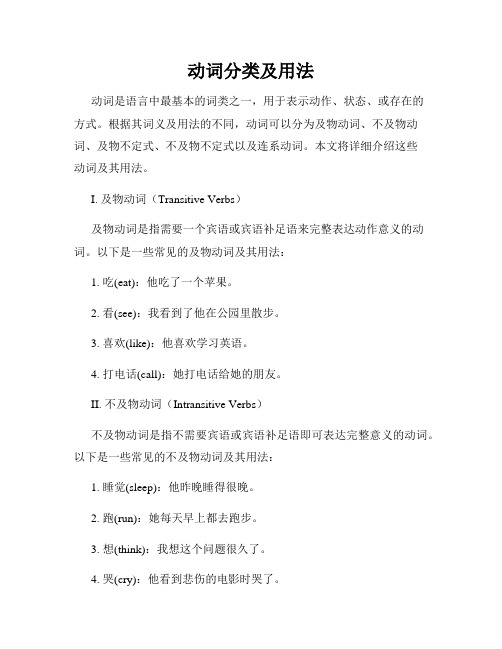
动词分类及用法动词是语言中最基本的词类之一,用于表示动作、状态、或存在的方式。
根据其词义及用法的不同,动词可以分为及物动词、不及物动词、及物不定式、不及物不定式以及连系动词。
本文将详细介绍这些动词及其用法。
I. 及物动词(Transitive Verbs)及物动词是指需要一个宾语或宾语补足语来完整表达动作意义的动词。
以下是一些常见的及物动词及其用法:1. 吃(eat):他吃了一个苹果。
2. 看(see):我看到了他在公园里散步。
3. 喜欢(like):他喜欢学习英语。
4. 打电话(call):她打电话给她的朋友。
II. 不及物动词(Intransitive Verbs)不及物动词是指不需要宾语或宾语补足语即可表达完整意义的动词。
以下是一些常见的不及物动词及其用法:1. 睡觉(sleep):他昨晚睡得很晚。
2. 跑(run):她每天早上都去跑步。
3. 想(think):我想这个问题很久了。
4. 哭(cry):他看到悲伤的电影时哭了。
III. 及物不定式(Transitive Infinitives)及物不定式是作为及物动词的宾语的不定式形式。
以下是一些常见的及物动词及其后接的及物不定式:1. 希望(hope):我希望能够旅行世界各地。
2. 想要(want):他想要学习新的技能。
3. 计划(plan):我们计划明天去购物。
4. 学会(learn):她学会了弹钢琴。
IV. 不及物不定式(Intransitive Infinitives)不及物不定式是不需要宾语的不定式形式。
以下是一些常见的不及物动词及其后接的不及物不定式:1. 学习(learn):他每天都努力学习。
2. 出发(depart):明天我们将出发去旅行。
3. 睡觉(sleep):他很晚才睡觉。
4. 练习(practice):我需要练习我的英语口语。
V. 连系动词(Linking Verbs)连系动词(也称为系动词)用于连接主语和表语,表达主语的状态、特征或属性。
常见英语动词包括及物动词,不及物动词的_固定搭配.docx
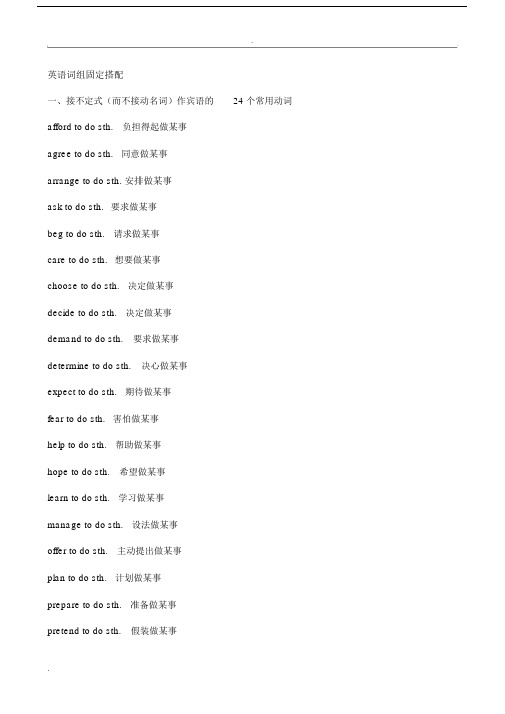
.英语词组固定搭配一、接不定式(而不接动名词)作宾语的24 个常用动词afford to do sth.负担得起做某事agree to do sth.同意做某事arrange to do sth. 安排做某事ask to do sth.要求做某事beg to do sth.请求做某事care to do sth.想要做某事choose to do sth.决定做某事decide to do sth.决定做某事demand to do sth.要求做某事determine to do sth.决心做某事expect to do sth.期待做某事fear to do sth.害怕做某事help to do sth.帮助做某事hope to do sth.希望做某事learn to do sth.学习做某事manage to do sth.设法做某事offer to do sth.主动提出做某事plan to do sth.计划做某事prepare to do sth.准备做某事pretend to do sth.假装做某事promise to do sth.答应做某事refuse to do sth.拒绝做某事want to do sth.想要做某事wish to do sth.希望做某事注:有些不及物动词后习惯上也接不定式,不接动名词:aim to do sth.打算做某事fail to do sth.未能做某事long to do sth.渴望做某事happen to do sth.碰巧做某事hesitate to do sth.犹豫做某事struggle to do sth.努力做某事二、接不定式作宾补的36 个常用动词advise sb. to do sth.建议某人做某事allow sb. to do sth.允许某人做某事ask sb. to do sth. 请(叫)某人做某事bear sb. to do sth. 忍受某人做某事beg sb. to do sth.请求某人做某事cause sb. to do sth. 导致某人做某事command sb. to do sth.命令某人做某事drive sb. to do sth . 驱使某人做某事elect sb. to do sth.选举某人做某事encourage sb. to do sth.鼓励某人做某事forbid sb. to do sth.禁止某人做某事force sb. to do sth.强迫某人做某事get sb. to do sth.使(要)某人做某事hate sb. to do sth.讨厌某人做某事help sb. to do sth.帮助某人做某事intend sb. to do sth.打算要某人做某事invite sb. to do sth.邀请某人做某事leave sb. to do sth.留下某人做某事like sb. to do sth.喜欢某人做某事mean sb. to do sth.打算要某人做某事need sb. to do sth.需要某人做某事oblige sb. to do sth.迫使某人做某事order sb. to do sth.命令某人做某事permit sb. to do sth.允许某人做某事persuade sb. to do sth.说服某人做某事prefer sb. to do sth.宁愿某人做某事request sb. to do sth.要求某人做某事remind sb. to do sth.提醒某人做某事teach sb. to do sth . 教某人做某事tell sb. to do sth.告诉某人做某事train sb. to do sth.训练某人做某事trouble sb. to do sth.麻烦某人做某事warn sb. to do sth.警告某人做某事wish sb. to do sth.希望某人做某事注:不要受汉语意思的影响而误用以下动词句型:要表示以上意思,可换用其他表达:汉语的“原谅某人做某事”,英语可说成 excuse [forgive] sb. for doing sth. 。
常见英语动词包括及物动词,不及物动词的_固定搭配
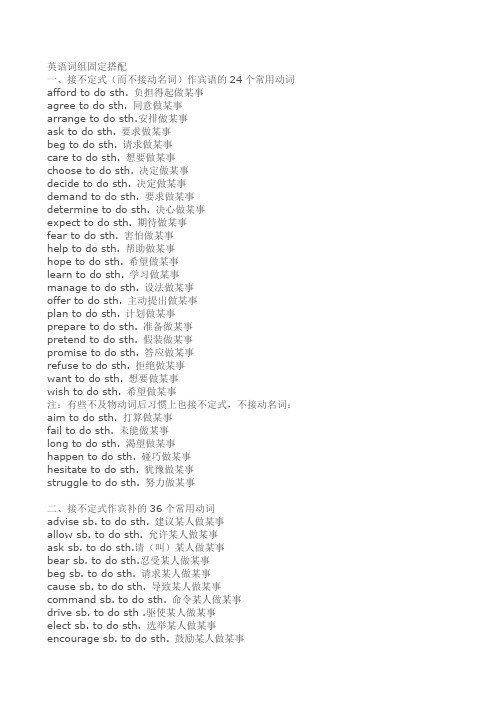
英语词组固定搭配一、接不定式(而不接动名词)作宾语的24个常用动词afford to do sth. 负担得起做某事agree to do sth. 同意做某事arrange to do sth.安排做某事ask to do sth. 要求做某事beg to do sth. 请求做某事care to do sth. 想要做某事choose to do sth. 决定做某事decide to do sth. 决定做某事demand to do sth. 要求做某事determine to do sth. 决心做某事expect to do sth. 期待做某事fear to do sth. 害怕做某事help to do sth. 帮助做某事hope to do sth. 希望做某事learn to do sth. 学习做某事manage to do sth. 设法做某事offer to do sth. 主动提出做某事plan to do sth. 计划做某事prepare to do sth. 准备做某事pretend to do sth. 假装做某事promise to do sth. 答应做某事refuse to do sth. 拒绝做某事want to do sth. 想要做某事wish to do sth. 希望做某事注:有些不及物动词后习惯上也接不定式,不接动名词:aim to do sth. 打算做某事fail to do sth. 未能做某事long to do sth. 渴望做某事happen to do sth. 碰巧做某事hesitate to do sth. 犹豫做某事struggle to do sth. 努力做某事二、接不定式作宾补的36个常用动词advise sb. to do sth. 建议某人做某事allow sb. to do sth. 允许某人做某事ask sb. to do sth.请(叫)某人做某事bear sb. to do sth.忍受某人做某事beg sb. to do sth. 请求某人做某事cause sb. to do sth. 导致某人做某事command sb. to do sth. 命令某人做某事drive sb. to do sth .驱使某人做某事elect sb. to do sth. 选举某人做某事encourage sb. to do sth. 鼓励某人做某事expect sb. to do sth. 期望某人做某事forbid sb. to do sth. 禁止某人做某事force sb. to do sth. 强迫某人做某事get sb. to do sth. 使(要)某人做某事hate sb. to do sth. 讨厌某人做某事help sb. to do sth. 帮助某人做某事intend sb. to do sth. 打算要某人做某事invite sb. to do sth. 邀请某人做某事leave sb. to do sth. 留下某人做某事like sb. to do sth. 喜欢某人做某事mean sb. to do sth. 打算要某人做某事need sb. to do sth. 需要某人做某事oblige sb. to do sth. 迫使某人做某事order sb. to do sth. 命令某人做某事permit sb. to do sth. 允许某人做某事persuade sb. to do sth. 说服某人做某事prefer sb. to do sth. 宁愿某人做某事request sb. to do sth. 要求某人做某事remind sb. to do sth. 提醒某人做某事teach sb. to do sth .教某人做某事tell sb. to do sth. 告诉某人做某事train sb. to do sth. 训练某人做某事trouble sb. to do sth. 麻烦某人做某事want sb. to do sth. 想要某人做某事warn sb. to do sth. 警告某人做某事wish sb. to do sth. 希望某人做某事注:不要受汉语意思的影响而误用以下动词句型:要表示以上意思,可换用其他表达:汉语的“原谅某人做某事”,英语可说成excuse [forgive] sb. for doing sth.。
英语中动词的用法总结

英语中动词的用法总结动词是英语中最主要的词类之一,用于表示行为、状态或存在。
以下是动词的用法总结:1. 行为动词:用于表示人或物体的具体行为,如run(跑)、jump (跳)、eat(吃)等。
2. 状态动词:用于表示状态或存在,如be(是)、seem(似乎)、have(有)等。
3. 助动词:辅助其他动词的动词,用于构成时态、语态、否定等,如be、do、have等。
4. 不及物动词:后面不加宾语的动词,表示动作发出者是主语本身,如sleep(睡觉)、arrive(到达)等。
5. 及物动词:后面需要加宾语的动词,表示动作的直接对象,如read(读)、buy(买)等。
6. 及物和不及物动词:有些动词既可以是及物动词,也可以是不及物动词,具体取决于是否加宾语,如open(打开)和open the door(打开门)。
7. 及物动词的间接宾语和直接宾语:有些及物动词需要两个宾语,一个是直接宾语表示动作的直接对象,另一个是间接宾语表示动作的间接对象,如give(给)。
8. 及物动词的宾语补足语:有些及物动词需要宾语补足语来补充说明动作,使句子更完整,如make(使成为)、call(称呼)等。
9. 不定式:动词的一种形式,常以to开头,作为动词短语的基本形式,如to go(去)、to eat(吃)等。
10. 分词:动词的一种形式,常用于进行时态和完成时态,如running(正在跑)、eaten(已吃)等。
11. 动名词:动词的一种形式,用作名词,表示一种动作或行为,如running(跑步)、swimming(游泳)等。
总体来说,动词在英语中有多种用法,具体用法根据上下文和语法规则来决定。
理解动词的不同用法,可以帮助我们更好地理解和运用英语。
动词的分类及用法总结
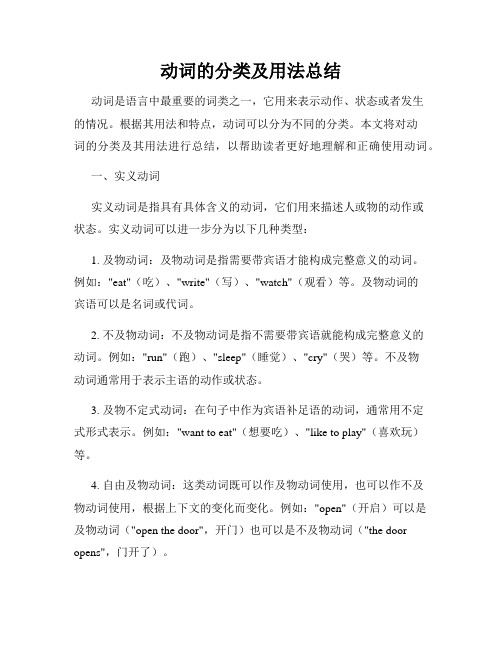
动词的分类及用法总结动词是语言中最重要的词类之一,它用来表示动作、状态或者发生的情况。
根据其用法和特点,动词可以分为不同的分类。
本文将对动词的分类及其用法进行总结,以帮助读者更好地理解和正确使用动词。
一、实义动词实义动词是指具有具体含义的动词,它们用来描述人或物的动作或状态。
实义动词可以进一步分为以下几种类型:1. 及物动词:及物动词是指需要带宾语才能构成完整意义的动词。
例如:"eat"(吃)、"write"(写)、"watch"(观看)等。
及物动词的宾语可以是名词或代词。
2. 不及物动词:不及物动词是指不需要带宾语就能构成完整意义的动词。
例如:"run"(跑)、"sleep"(睡觉)、"cry"(哭)等。
不及物动词通常用于表示主语的动作或状态。
3. 及物不定式动词:在句子中作为宾语补足语的动词,通常用不定式形式表示。
例如:"want to eat"(想要吃)、"like to play"(喜欢玩)等。
4. 自由及物动词:这类动词既可以作及物动词使用,也可以作不及物动词使用,根据上下文的变化而变化。
例如:"open"(开启)可以是及物动词("open the door",开门)也可以是不及物动词("the door opens",门开了)。
二、系动词系动词是用来连接主语和表语的动词,它们没有实际的动作含义,主要用于描述主语的状态、特征或性质。
常见的系动词有:"be"(是)、"seem"(似乎)、"appear"(显得)等。
系动词的用法多样,可以与形容词连用,表示主语的特征或性质,如:"She is beautiful"(她很漂亮);也可以与名词连用,表示主语的身份或职业,如:"He is a doctor"(他是一名医生)。
动词的及物和不及物动词

动词的及物和不及物动词动词是语言中最基本的词类之一,用来表示一种动作、状态、感觉或思想。
根据动词的句法特性,可以将动词分为及物动词和不及物动词。
本文将详细解释及物动词和不及物动词的概念、特点以及使用方法。
一、及物动词及物动词是指在句子中需要有宾语来接受动作的动词。
宾语可以是名词、代词、动词不定式或动名词短语等。
当我们使用及物动词时,我们需要同时提供动作的执行者和承受者。
以下是及物动词的一些特点和使用方法:1. 动宾结构:及物动词常与宾语一起构成动宾结构,例如:"She reads a book."(她在读一本书。
)在这个例句中,"reads"是及物动词,它的宾语是"a book"。
2. 可以使用被动语态:及物动词可以转化为被动语态,将动作的承受者作为主语,动作的执行者作为被动语态的介词短语。
例如:"The book is read by her."(这本书被她读了。
)3. 需要宾语的支配:及物动词需要宾语的存在,否则句子会显得不完整。
例如:"He bought."(他买了。
)这个句子中,没有宾语,所以缺乏信息。
二、不及物动词不及物动词是指不需要宾语来接受动作的动词。
其动作的完成仅涉及到主语本身。
以下是不及物动词的一些特点和使用方法:1. 不需要宾语:不及物动词不需要宾语来补充动作的执行,它的使用不影响句子的完整性。
例如:"She sleeps."(她睡觉。
)在这个例句中,"sleeps"是不及物动词,没有宾语。
2. 不可使用被动语态:由于不及物动词只涉及到主语本身,所以不可以将其转化为被动语态。
例如:"He swims."(他游泳。
)不可以说:"He is swum."(他被游泳。
)注意事项:1. 及物动词和不及物动词之间没有明确的划分线,有些动词既可以作及物动词,也可以作不及物动词,意思和用法会有所不同。
动词的分类及用法
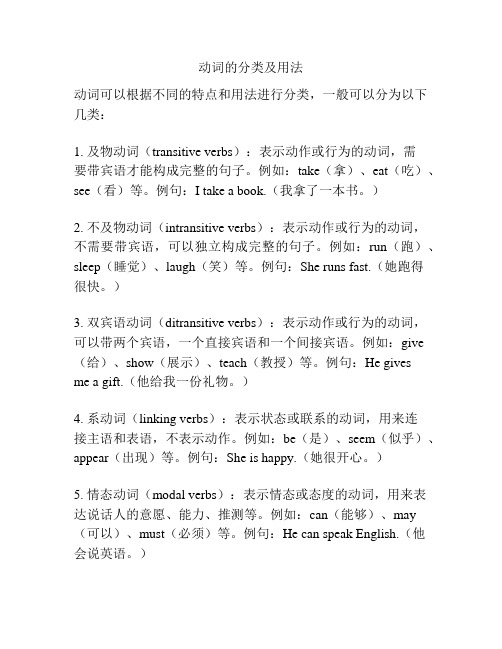
动词的分类及用法动词可以根据不同的特点和用法进行分类,一般可以分为以下几类:1. 及物动词(transitive verbs):表示动作或行为的动词,需要带宾语才能构成完整的句子。
例如:take(拿)、eat(吃)、see(看)等。
例句:I take a book.(我拿了一本书。
)2. 不及物动词(intransitive verbs):表示动作或行为的动词,不需要带宾语,可以独立构成完整的句子。
例如:run(跑)、sleep(睡觉)、laugh(笑)等。
例句:She runs fast.(她跑得很快。
)3. 双宾语动词(ditransitive verbs):表示动作或行为的动词,可以带两个宾语,一个直接宾语和一个间接宾语。
例如:give (给)、show(展示)、teach(教授)等。
例句:He givesme a gift.(他给我一份礼物。
)4. 系动词(linking verbs):表示状态或联系的动词,用来连接主语和表语,不表示动作。
例如:be(是)、seem(似乎)、appear(出现)等。
例句:She is happy.(她很开心。
)5. 情态动词(modal verbs):表示情态或态度的动词,用来表达说话人的意愿、能力、推测等。
例如:can(能够)、may (可以)、must(必须)等。
例句:He can speak English.(他会说英语。
)6. 不定式动词(infinitive verbs):以to开头的动词形式,可以做动词的主语、宾语、表语等。
例如:to go(去)、to eat (吃)等。
例句:To study is important.(学习很重要。
)这些分类只是一种常见的方式,实际上动词的分类还有其他细分。
需要根据具体语境和用法来判断动词的分类和使用方法。
英语动词分类及用法表
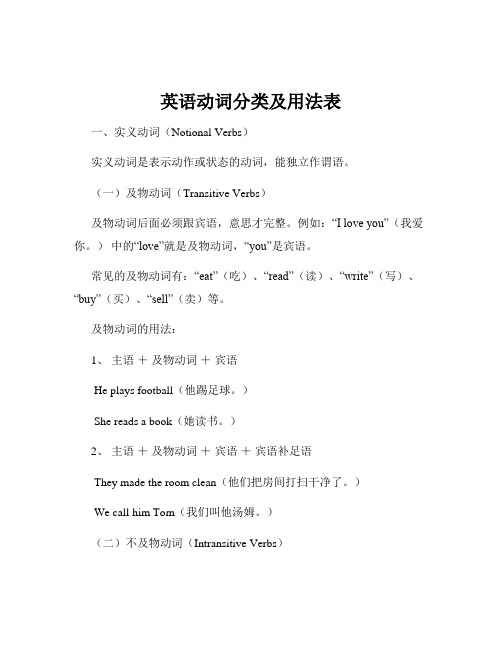
英语动词分类及用法表一、实义动词(Notional Verbs)实义动词是表示动作或状态的动词,能独立作谓语。
(一)及物动词(Transitive Verbs)及物动词后面必须跟宾语,意思才完整。
例如:“I love you”(我爱你。
)中的“love”就是及物动词,“you”是宾语。
常见的及物动词有:“eat”(吃)、“read”(读)、“write”(写)、“buy”(买)、“sell”(卖)等。
及物动词的用法:1、主语+及物动词+宾语He plays football(他踢足球。
)She reads a book(她读书。
)2、主语+及物动词+宾语+宾语补足语They made the room clean(他们把房间打扫干净了。
)We call him Tom(我们叫他汤姆。
)(二)不及物动词(Intransitive Verbs)不及物动词本身意义完整,后面不需要跟宾语。
例如:“The bird flies”(鸟飞。
)中的“flies”就是不及物动词。
常见的不及物动词有:“sleep”(睡觉)、“run”(跑)、“swim”(游泳)、“laugh”(笑)、“cry”(哭)等。
不及物动词的用法:1、主语+不及物动词The sun rises(太阳升起。
)It rains(下雨了。
)二、系动词(Linking Verbs)系动词用于连接主语和表语,表示主语的身份、性质、状态等。
常见的系动词有:1、状态系动词:be(am/is/are/was/were)I am a student(我是一名学生。
)They were happy(他们曾经很开心。
)2、持续系动词:keep, remain, stayHe always keeps silent(他总是保持沉默。
)The weather remains cold(天气仍然很冷。
)3、表象系动词:seem, appearShe seems tired(她看起来很累。
初中动词用法归类
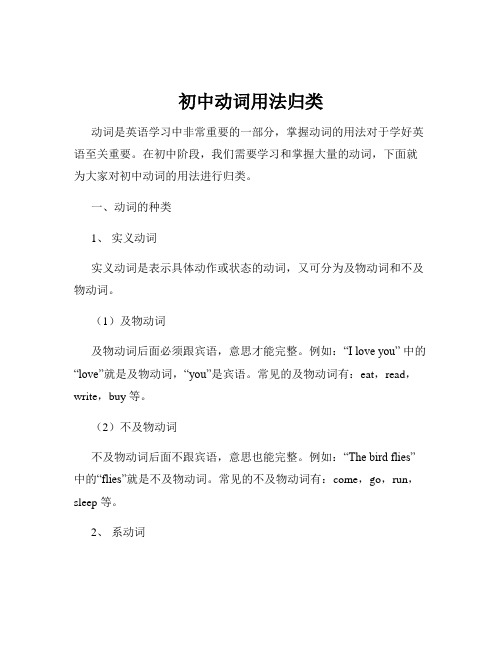
初中动词用法归类动词是英语学习中非常重要的一部分,掌握动词的用法对于学好英语至关重要。
在初中阶段,我们需要学习和掌握大量的动词,下面就为大家对初中动词的用法进行归类。
一、动词的种类1、实义动词实义动词是表示具体动作或状态的动词,又可分为及物动词和不及物动词。
(1)及物动词及物动词后面必须跟宾语,意思才能完整。
例如:“I love you” 中的“love”就是及物动词,“you”是宾语。
常见的及物动词有:eat,read,write,buy 等。
(2)不及物动词不及物动词后面不跟宾语,意思也能完整。
例如:“The bird flies” 中的“flies”就是不及物动词。
常见的不及物动词有:come,go,run,sleep 等。
2、系动词系动词本身有词义,但不能单独作谓语,必须和表语一起构成谓语。
常见的系动词有:be(am,is,are,was,were),look,seem,feel,sound,taste,smell 等。
例如:“She is beautiful” 中“is”是系动词,“beautiful”是表语。
3、助动词助动词本身没有词义,不能单独作谓语,只能和主要动词一起构成谓语,表示时态、语态、语气等。
常见的助动词有:do,does,did,have,has,had,will,would,shall,should 等。
例如:“He doesn'tlike sports” 中“doesn't”是助动词。
4、情态动词情态动词本身有一定的词义,但不能单独作谓语,只能和主要动词一起构成谓语,表示说话人的语气、态度、情感等。
常见的情态动词有:can,could,may,might,must,need,ought to,dare,shall,should 等。
例如:“You must study hard” 中“must”是情态动词。
二、动词的时态1、一般现在时(1)表示经常发生的动作或存在的状态。
- 1、下载文档前请自行甄别文档内容的完整性,平台不提供额外的编辑、内容补充、找答案等附加服务。
- 2、"仅部分预览"的文档,不可在线预览部分如存在完整性等问题,可反馈申请退款(可完整预览的文档不适用该条件!)。
- 3、如文档侵犯您的权益,请联系客服反馈,我们会尽快为您处理(人工客服工作时间:9:00-18:30)。
英语词组固定搭配一、接不定式(而不接动名词)作宾语的24个常用动词afford to do sth. 负担得起做某事agree to do sth. 同意做某事arrange to do sth.安排做某事ask to do sth. 要求做某事beg to do sth. 请求做某事care to do sth. 想要做某事choose to do sth. 决定做某事decide to do sth. 决定做某事demand to do sth. 要求做某事determine to do sth. 决心做某事expect to do sth. 期待做某事fear to do sth. 害怕做某事help to do sth. 帮助做某事hope to do sth. 希望做某事learn to do sth. 学习做某事manage to do sth. 设法做某事offer to do sth. 主动提出做某事plan to do sth. 计划做某事prepare to do sth. 准备做某事pretend to do sth. 假装做某事promise to do sth. 答应做某事refuse to do sth. 拒绝做某事want to do sth. 想要做某事wish to do sth. 希望做某事注:有些不及物动词后习惯上也接不定式,不接动名词:aim to do sth. 打算做某事fail to do sth. 未能做某事long to do sth. 渴望做某事happen to do sth. 碰巧做某事hesitate to do sth. 犹豫做某事struggle to do sth. 努力做某事二、接不定式作宾补的36个常用动词advise sb. to do sth. 建议某人做某事allow sb. to do sth. 允许某人做某事ask sb. to do sth.请(叫)某人做某事bear sb. to do sth.忍受某人做某事beg sb. to do sth. 请求某人做某事cause sb. to do sth. 导致某人做某事command sb. to do sth. 命令某人做某事drive sb. to do sth .驱使某人做某事elect sb. to do sth. 选举某人做某事encourage sb. to do sth. 鼓励某人做某事expect sb. to do sth. 期望某人做某事forbid sb. to do sth. 禁止某人做某事get sb. to do sth. 使(要)某人做某事hate sb. to do sth. 讨厌某人做某事help sb. to do sth. 帮助某人做某事intend sb. to do sth. 打算要某人做某事invite sb. to do sth. 邀请某人做某事leave sb. to do sth. 留下某人做某事like sb. to do sth. 喜欢某人做某事mean sb. to do sth. 打算要某人做某事need sb. to do sth. 需要某人做某事oblige sb. to do sth. 迫使某人做某事order sb. to do sth. 命令某人做某事permit sb. to do sth. 允许某人做某事persuade sb. to do sth. 说服某人做某事prefer sb. to do sth. 宁愿某人做某事request sb. to do sth. 要求某人做某事teach sb. to do sth .教某人做某事tell sb. to do sth. 告诉某人做某事train sb. to do sth. 训练某人做某事trouble sb. to do sth. 麻烦某人做某事want sb. to do sth. 想要某人做某事warn sb. to do sth. 警告某人做某事wish sb. to do sth. 希望某人做某事注:不要受汉语意思的影响而误用以下动词句型:要表示以上意思,可换用其他表达:汉语的“原谅某人做某事”,英语可说成excuse [forgive] sb. for doing sth.。
汉语的“希望某人做某事”,英语可说成wish sb. to do sth.。
汉语的“建议某人做某事”,英语可说成advise sb. to do sth.。
汉语的“安排某人做某事”,英语可说成arrange for sb. to do sth.。
汉语的“要求某人做某事”,英语可说成demand of sb. to do sth.。
汉语的“感谢某人做某事”,英语可说成thank sb. for doing sth.。
汉语的“祝贺某人做某事”,英语可说成congratulate sb. on doing sth.。
汉语的“阻止某人做某事”,英语可说成prevent sb. from doing sth.。
三、接动名词(不接不定式)作宾语的34个常用动词admit doing sth. 承认做某事 ? ? ? ? ? ? ? ? ? ?advise doing sth. 建议做某事allow doing sth. 允许做某事 ? ? ? ? ? ? ? ? ? ? appreciate doing sth. 感激做某事avoid doing sth. 避免做某事 ? ? ? ? ? ? ? ? ? ? consider doing sth. 考虑做某事delay doing sth. 推迟做某事 ? ? ? ? ? ? ? ? ? ? deny doing sth. 否认做某事discuss doing sth. 讨论做某事 ? ? ? ? ? ? ? ? ? dislike doing sth. 不喜欢做某事enjoy doing sth. 喜爱做某事 ? ? ? ? ? ? ? ? ? ? escape doing sth. 逃脱做某事excuse doing sth. 原谅做某事 ? ? ? ? ? ? ? ? ? ?fancy doing sth. 设想做某事finish doing sth. 完成做某事 ? ? ? ? ? ? ? ? ? ? ?forbid doing sth. 禁止做某事forgive doing sth. 原谅做某事 ? ? ? ? ? ? ? ? ? ?give up doing sth. 放弃做某事imagine doing sth. 想象做某事 ? ? ? ? ? ? ? ? ? keep doing sth. 保持做某事mention doing sth. 提及做某事 ? ? ? ? ? ? ? ? ? mind doing sth. 介意做某事miss doing sth. 错过做某事 ? ? ? ? ? ? ? ? ? ? ? ?pardon doing sth. 原谅做某事permit doing sth. 允许做某事 ? ? ? ? ? ? ? ? ? ? ?practice doing sth. 练习做某事prevent doing sth. 阻止做某事 ? ? ? ? ? ? ? ? ? ? prohibit doing sth. 禁止做某事put off doing sth. 推迟做某事 ? ? ? ? ? ? ? ? ? ? ?report doing sth. 报告做某事risk doing sth. 冒险做某事 ? ? ? ? ? ? ? ? ? ? ? ? stop doing sth. 停止做某事suggest doing sth. 建议做某事 ? ? ? ? ? ? ? ? ? ? understand doing sth. 理解做某事四、接现在分词作宾补的20个常用动词bring sb. doing sth.引起某人做某事 ? ?catch sb. doing sth. 碰上(撞上)某人做某事discover sb. doing sth. 发现某人做某事 ? feel sb. doing sth. 感觉某人做某事find sb. doing sth. 碰上(撞上)某人做某事 ?get sb. doing sth. 使某人做某事have sb. doing sth. 使某人做某事 ? ? ? ? ? ? hear sb. doing sth. 听见某人做某事keep sb. doing sth. 使某人不停地做某事 ? ?listen to sb. doing sth. 听某人做某事look at sb. doing sth. 看着某人做某事 ? ? ? ?notice sb. doing sth. 注意到某人做某事observe sb. doing sth. 观察某人做某事 ? ? ?prevent sb. doing sth. 阻止某人做某事see sb. doing sth. 看见某人做某事 ? ? ? ? ? ?send sb. doing sth.使某人(突然)做某事set sb. doing sth. 使(引起)某人做某事 ? ? start sb. doing sth. 使某人开始做某事stop sb. doing sth. 阻止某人做某事 ? ? ? ? ? watch sb. doing sth. 观五、接动词原形作宾补的11个常用动词feel sb. do sth. 感觉某人做某事 ? ? ? ? ? ? ? ? ? ? ? ? ? ? ? ?have sb. do sth. 使某人做某事hear sb. do sth. 听见某人做某事 ? ? ? ? ? ? let sb. do sth.让某人做某事listen to sb. do sth. 听着某人做某事 ? ? ? ?look at sb. do sth. 看着某人做某事make sb. do sth. 使某人做某事 ? ? ? ? ? ? ?notice sb. do sth. 注意某人做某事observe sb. do sth. 观察某人做某事 ? ? ? ? see sb. do sth. 看见某人做某事watch sb. do sth. 观察某人做某事察某人做某事六、接不定式或动名词作宾语意思相同的12个动词like to do sth / like doing sth. 喜欢做某事love to do sth / love doing sth. 喜欢做某事hate to do sth / hate doing sth. 憎恨做某事prefer to do sth / prefer doing sth. 宁可做某事begin to do sth / begin doing sth. 开始做某事start to do sth / start doing sth. 开始做某事continue to do sth / continue doing sth. 继续做某事can’t bear to do sth / can’t bear doing sth. 不能忍受做某事bother to do sth / bother doing sth. 麻烦做某事intend to do sth / intend doing sth.想要做某事attempt to do sth / attempt doing sth. 试图做某事cease to do sth / cease doing sth. 停止做某事七、接不定式或动名词作宾语意思不同的7个动词(1) remember to do sth. 记住要做某事 ? ? ? ? ? ? ? ? ? ? ? ?remember doing sth.记住曾做过某事(2) forget to do sth. 忘记要做某事 ? ? ? ? ? ? ? ? ? ? ? ? forget doing sth. 忘记曾做过某事(3) regret to do sth. 后悔(遗憾)要做某事 ? ? ? ? regret doing sth. 后悔(遗憾)曾做过某事(4) try to do sth. 设法要做某事 ? ? ? ? ? ? ? ? ? ? ? ? ? ? ? ?try doing sth. 做某事试试看有何效果(5) mean to do sth. 打算做某事 ? ? ? ? ? ? ? ? ? ? ? ? ? ? ? ?mean doing sth. 意味着做某事(6) can’t help to do sth. 不能帮助做某事? ? ? ? ? ? ? ? can’t help doi ng sth. 禁不住做某事(7) go on to do sth. 做完某事后接着做另一事 ? ? ? ? go on doing sth. 继续做一直在做的事注:stop to do sth. 与stop doing sth.也不同,前者指停下来去做某事,后者指停止正在做的事,但stop to do sth. 中的不定式不是宾语,是目的状语。
